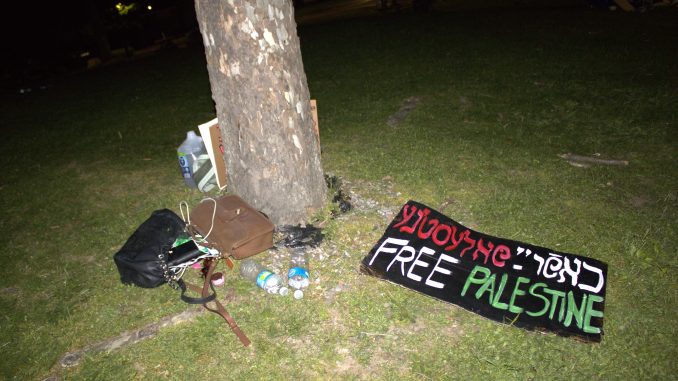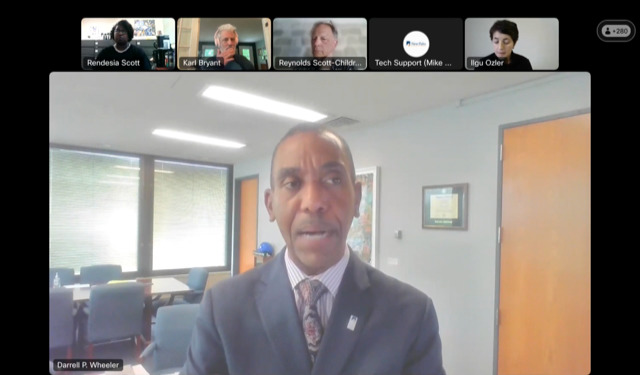
Faculty Senate Calls For Attorney General Investigation of SUNY and State and Local Agencies
SUNY New Paltz’s graduating class of 2024 has walked across the Athletic & Wellness Center stage, thrown their caps in the air and received their diplomas. Amidst the celebrations, the Faculty Liberal Arts and Sciences Senate has called the New York state attorney general to investigate who is responsible for the police shutdowns of pro-Palestinian encampments across SUNY campuses. Police shut down encampments and arrested demonstrators at SUNY New Paltz, Purchase, University at Buffalo, Stony Brook University and Fashion Institute of Technology. Police cleared all encampments at SUNYs on May 2 — except for one in the lobby of FIT, which the NYPD cleared on May 8. The statewide crackdown on the protests that occurred on May 2 has led some to consider the role of outside authorities in President Wheeler’s decision to call police to the encampment.
The faculty senate held a special meeting on May 15, in which members approved the resolution calling for New York State Attorney General Letitia James to determine whether state agencies and officials ordered a state-wide crackdown on encampments. The senate is calling for the attorney general to investigate Governor Kathy Hochul, the Ulster County Sheriff’s office and the SUNY administration at large to determine whether these agencies and officials broke state and SUNY policies.
The faculty senate’s decision indicates the impression that officials beyond Wheeler are also responsible for police intervention at the encampment.
“This is bigger than him, and we want to understand how and why these decisions were made, especially because they ultimately repressed student speech,” said a source present at the meeting, who requested to remain anonymous.
According to University Spokesperson Andrew Bruso, Wheeler maintains it was his sole decision to call officers to the encampment on May 2.
SUNY Chancellor John B. King states that each SUNY campus made the decision to call officers to encampment — not SUNY leadership. “Each individual campus makes decisions about when they’ll engage with law enforcement,” said SUNY Chancellor John B. King and reported by Planet Waves FM-Pacifica Radio. “We’ve been very clear at SUNY that we express the right to expression and the robust exchange of ideas, and that free expression is not limitless. It can never be allowed to turn into harassment, discrimination, violence, vandalism or disruption of the functioning of campus in a way that undermines the education of other students.”
According to Wheeler at the faculty senate meeting, “In our meetings with the Chancellor and with other SUNY presidents, it was very clear that SUNY had an obligation and was very concerned about encampments on campuses.”
“It was important for me to engage and to respond to the encampment in a structured and timely way,” he said. “I was also beginning to receive communications from students and parents who were not part of the encampment … and those individuals expressed concern about the encampment being on campus.”
Wheeler closed his remarks by emphasizing “the matter of the encampment coming down and not the protest in terms of the subject matter — that was never the issue.” He stated the administration supported other means for the students to protest in solidarity with Gaza, but the encampment posed a problem.
In addition to the resolution calling for the attorney general to investigate, the faculty senate also called for campus administration to grant students who participated in the encampment amnesty from campus conduct charges and condemned the police force used on students. The senate called for the administration to return any personal items demonstrators lost when officers cleared the encampment, and to cover the costs of any damaged, destroyed or unreturned items.

The faculty senate joins other local representatives who are also calling on the attorney general to investigate. New Paltz Deputy Mayor Alexandria Wojcik issued a statement with Local Progress, a collective of progressive leaders, on X. “This horrifying abuse of power demands swift accountability,” the statement reads. “As local representatives from across New York State, we call on State Attorney General Letitia James to open a full and immediate investigation into the recent police action at SUNY New Paltz, and all police action taken against students in New York over the past few weeks.”
In a letter to the Daily Freeman, president of the Ellenville NAACP chapter — the only NAACP chapter in Ulster County — President Maude Bruce calls for Ulster County to investigate the May 2 police crackdown. “While Ulster County Sheriff Juan Figueroa put out a statement defending the actions of law enforcement agents, his description is an outlier among the narratives about May 2,” Bruce writes.
131 faculty members have also signed a letter sent to Wheeler and SUNY Chancellor King, in which they denounce “the use of excessive force in the police response, activated by state officials” regarding the officer’s removal of the protestors on May 2. The letter noted that the police crackdown occurred after demonstrators removed all tents from the encampment zone as Wheeler requested in an email sent to all students on May 1. Several faculty chairs have signed the petition including the chairs of Black studies, women’s, gender, & sexuality studies, English, history, sociology, psychology, political science and design departments.
“We may not agree with each other on how to respond to the Israeli-Palestinian conflict, the Israel-Hamas war, or the rhetoric the protestors used. But we are clear in our condemnation of the police response as a brutal infringement of First Amendment freedoms,” the letter states.
Arrested Students Receive No Charges Related To “Non-Violent Action” From the University
Students “related to non-violent actions,” who officers arrested on May 2 are not charged with any Student Code of Conduct violations, according to Bruso in a written statement. In the first emails sent by the Office of Student Conduct and Community Standards on May 3, students had to wait a “3-week period” after all commencement ceremonies to learn whether they would be charged with sanctions — a period which passed on May 23.
Commencement Committee Changes Graduation Ceremonies to Indoors Last-Minute
Four days before the 2024 graduation ceremonies, which usually happen outside on Old Main Quad, the Commencement Committee messaged students that the ceremonies would be held at the Athletic Wellness Center (AWC). The email announcing the change mentioned the new venue would improve potential traffic and weather issues and did not mention law enforcement.
However, two days after the original email from the Commencement Committee, Wheeler sent an email to students stating the change was because New York State law enforcement required increased police officers at outdoor ceremonies. He acknowledges students’ complaints about the last-minute change and a petition with 3,000+ signatures to reverse the decision. Wheeler writes that during planning for the outdoor ceremony, “it became abundantly clear that any outdoor ceremony would require significant presence of outside law enforcement — something we wanted to avoid.” Bruso said in a written statement that the Commencement Committee spoke to Student Association and Residence Hall Student Association leaders before making the decision.
In the email, Wheeler also cites an April 29 letter Governor Kathy Hochul sent to college presidents to explain the venue change. Hochul writes that New York’s Human Rights Law prohibits the harassment of students — specifically antisemitism. The letter states, “All institutions must act to aggressively guard against antisemitism and all forms of hateful or discriminatory rhetoric, on and off campus, as well as to uphold the solemn right to demonstrate in support of one’s beliefs.” She does not mention student encampments, which students had established at Columbia University and City College when she wrote the letter.
Due to the limited capacity of the AWC, the Commencement Committee divided both ceremonies into a morning and afternoon program each day and placed students in the programs based on academic majors. This meant students originally scheduled to graduate together did not get to do so. The Commencement Committee live-streamed the ceremonies for guests who did not have tickets and could no longer attend. When students walked across the stage, Wheeler remained seated and did not shake hands.
Officers arrested fourth-year psychology major Julia Rose Lieberstein at the encampment, and she walked across graduation on May 18. “You could definitely feel the tension in the room. People were really upset. The fact that it had to be inside was really unfair,” she said. “I saw my friends last year graduate and that was such a great feeling of having your friends there to support you. I didn’t have that.”
“I’m moving. I’m leaving. So it feels like I don’t have much of an impact, or can make a significant change in the school system right now,” Lieberstein said.
The graduation ceremonies did not go without mention of May 2. At Sunday’s ceremonies, salutatorian Sen Tanikawa-Oglesby spoke of the Parker Quad encampment. “I, most importantly, learned that to be loved is to be seen, to be challenged, and to be in community with one another. On a quad not five minutes from here, there was a collective of people who taught me what love is,” Tanikawa-Oglesby said at graduation.
“I dedicate this to the 133 students, faculty, and community members who were brutalized at the hands of university sanctioned state troopers and state police in riot gear.”

